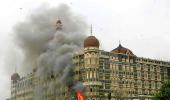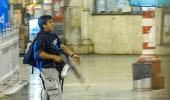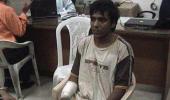'If we have to restrict and fight terrorism, first and foremost, we have to ensure communal harmony in the country.'

Six surgeries and 15 years later, Devika Rotawan still gets the occasional swelling or soreness in her right leg.
In a sense, it never really leaves her. The bullet injury from November 26, 2008, has not fully healed.
"I live with the memory. I wake up and go to bed with it," says the third year BA student, now 24.
She was nine when she sustained the injury and became the youngest to testify in court in the Mumbai attacks case.
She would end up picking out Lashkar-e-Taiba operative Ajmal Kasab from a police line-up of three suspects.
Rotawan had been at the Chhatrapati Shivaji Maharaj Terminus outstation platforms with her father and brother, waiting for a train to Pune, when an explosion scattered the crowd and she became one of the approximately 100 wounded by indiscriminate firing.
After months in hospital, her father's dry fruit business dwindled and her brother contracted spinal tuberculosis.
The night marked the end of Rotawan's childhood and the beginning of an ambition she is working on now -- to enter the Indian Police Service.
"I want to put an end to terrorism," she says.
A series of planned shootings with AK47s had terrorised the city at busy targets -- CSMT station, Taj, Trident, Leopold Cafe, Chabad House, and Cama Hospital.
For survivors and first responders, the incident is marked by anguish, frustration, and determination.
The siege has become among the most memorialised episodes in Mumbai's history: There are more than a dozen public and private tributes across the city, including plaques for those slain at the sites of the shootings, and local parks and chowks named after those who died saving lives.
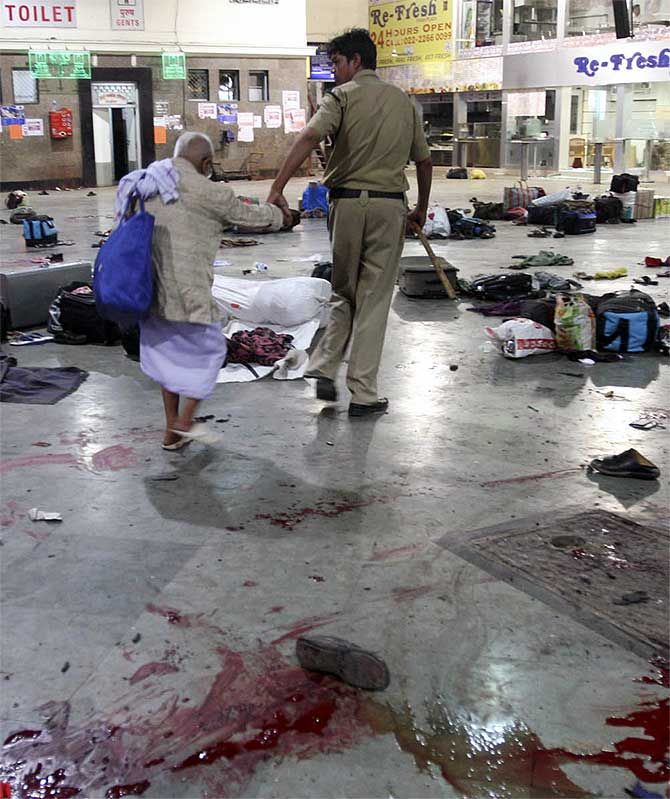
Elephant in the room
Many have repressed the event in the years that followed, says Bhisham Mansukhani, a consultant in the beverage industry, who was among the hostages trapped overnight at Taj.
"My co-survivors made it clear they did not want to talk about it. We would meet, but the incident was the elephant in the room."
Looking back, the experience gives him not only an appreciation of people but also of the reality we live in.
The morning Mansukhani and his mother were rescued, the administration had not even arranged to safely drop them home.
They had to hail a taxi themselves, and the cabbie -- in a moment of large-heartedness that is the Mumbaikar's only recourse in a crisis -- refused to accept payment.
None of the counsellors Mansukhani spoke to understood the survivors of terror strikes, but triggering memories returned during the attacks in Paris in 2015 and Nice in 2016.
"We need a safe space for non-judgemental discussion among individuals who have been scarred, without making it a matter of nationalism and patriotism," he says.
For Vishnu Zende, every time he takes his place in the announcer's booth at the CST station is a reminder of that night.
He was at the microphone on 26/11, at an elevation tucked away from the terrorists' view, when he heard the gunshots, saw passengers stumbling from the outstation platforms to the suburban side, followed by the "yamdoots" (messengers of death).
Over the next 20 minutes, he managed to warn commuters in five or six local trains that were pulling into the station to leave from the back exit immediately, putting hundreds out of harm's way.
"The train blasts had happened before that, and we started alerting people to report suspicious items. So it is important to remember the risks," says Zende.
The nurses at Cama Hospital would rather forget. Sister-in-charge Mina Jadhav's son still worries every time she switches to the late shift.
Every floor and entrance of the hospital, exclusively for women and children, now has armed guards, but that was not the case in 2008.
Jadhav was the first to hear the gunfire and see assailants Kasab and Abu Ismail jumping over the gates.
If she and the hospital attendants had not quickly switched off the lights and hid 20 patients and relatives in the bathroom, the surgical ward might have been struck too.
"I wasn't brave, I was just doing my job," Jadhav says. There is one thing she hopes people would discuss.
"We were promised increments by the authorities but no one is talking about that now."

How safe is Mumbai today?
Rajvardhan Sinha says in any battle you must always move forward. Going back can get you killed.
On 26/11, when terrorists took over the Taj hotel, Sinha, who at that time was deputy commissioner of police of Special Branch II, and his fellow officers encountered a hail of bullets while moving to the first floor.
Two cops rushed back to the surveillance room they had been in, but were promptly gunned down.
Ever since the war-like assaults shocked the city in 2008, security agencies have realised that going back is not an option.
"We learnt about a new kind of danger, and that we should always be planning in advance," says Sinha, who is now joint managing director of the Maharashtra State Security Corporation.
Every November, as people recount the courage he showed in holding off the gunmen, Sinha wonders where the next threat could come from.
In the last decade-and-a-half, while the police infrastructure has gone through a drastic overhaul, the challenges have changed and multiplied.
"If an incident were to happen again, it could be technologically much more advanced," he points out.

By most accounts, Mumbai's security establishment has grown in scope, resources, and in its understanding of terrorism.
Following the 2008 attacks, based on recommendations by the Ram Pradhan Committee, the National Investigation Agency and National Security Guard expanded into Mumbai, the Maharashtra Security Force was introduced, and more Anti-Terror Squad units were added.
Private establishments have ramped up security, too.
"When Taj and Trident were alerted months before the attack, since we had alerts of a potential threat, they did not want gun-wielding men in the reception because it could affect business," recalls Shirish Inamdar, former additional deputy commissioner of the Maharashtra state intelligence department.
"These iconic targets realised they have to be secured and the police are doing that now."
According to reports, the police have installed 5,000 CCTVs across the city and private establishments have 70,000 surveillance cameras.
After 26/11, the private security industry experienced an average annual growth of 20 per cent, until being slowed by COVID-19.
Coastal security looks different, too. Mumbai's fishermen have two jobs now, says Devendra Tandel, a representative of the city's traditional fisherfolk.
Now they not only hunt for fresh catch, but also look out for threats at sea.
"We have to be the eyes and ears of security agencies," says Tandel.
In 2008, terrorists had hijacked a fishing vessel and taken the sea route to carry out planned shootings.
In the last 15 years, the fishing community has observed more monitoring along Mumbai's 149-km long coastline: The city got two new coastal police stations, helicopters, nearly two dozen speed-boats, and recently two police jetties were announced.
But Tandel is not resting on his oars.
"Illegal fishing is still a problem and since it is indirectly linked with security, it has to be seriously curbed," he says.
During the monsoon, when trawling is prohibited, some vessels continue to ply the waters with their licence and number plates obscured.
Tandel has placed two demands before the state authorities.
To give small fishing vessels financial aid for fitting vehicle tracking systems -- a post-26/11 recommendation by security agencies that is still stuck, and the formation of a coordination committee so that in an emergency fishermen can swiftly reach out to the Coast Guard, Navy, Mumbai Coastal Police, Fisheries Department, and Intelligence Bureau.
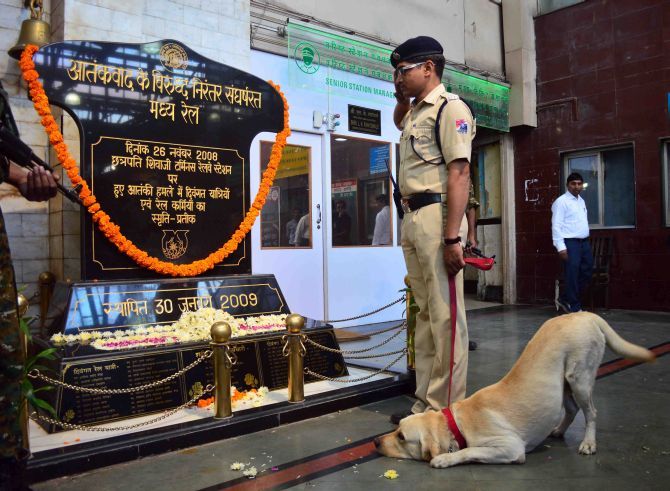
Given Mumbai's dense population and its status as the country's financial capital, it has been a target for sleeper cells and terror activities.
Security specialists maintain such threats can never be ruled out.
"While the last attack was in 2011, we cannot be complacent," says a city police official, who has been working on counter-terrorism for years.
"The calm could be attributed to improvements in our security, or the strength of enemies declining, or their target shifting to other centres," he says.
Some aspects of policing still require attention. As of 2022, the police-to-public ratio in Maharashtra is 136.45 personnel per 100,000 people, compared with the sanctioned 186.36.
"Mumbai will always be vulnerable," says former Mumbai police commissioner M N Singh, who had led the 1993 blasts investigations as joint commissioner-crime.
"Technology has developed so much that it is bound to be misused not only in the financial world but also in the security scenario."

As such, digital public goods will need protection.
"Superclass intelligence apparatus, a responsible media, and modernisation of weaponry will always be required," says Inamdar, who now teaches at intelligence departments in various states. But there is something more important, he adds. "If we have to restrict and fight terrorism, first and foremost, we have to ensure communal harmony in the country."
Feature Presentation: Aslam Hunani/Rediff.com


